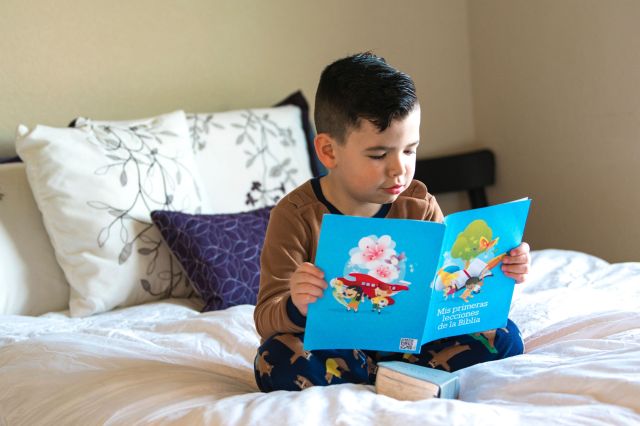
You know how it goes: Dinner was a fiasco, bathtime was a struggle, and the littles refused to put on PJs and brush their teeth. You finally got them ready, but now it’s past their bedtime, and it’s pretty much your bedtime, too.
As you’re tucking your child into bed, your eyes are drooping, your body is half-wilted. You are mentally snuggling into your own bed and letting the sweet, sweet wave of sleep wash over you.
And then comes the request: “Book! Read! Please!”
Now, I’m a full-time librarian and a mom, and storytime and reading before bed has pretty much always been my favorite time of day with my kid. Time stands still when I get to cozy up with my munchkin and talk about words, illustrations, and meanings. And I get to break out all of my character voices and listen to her try to repeat them.
But there have been several times in the past year where I have fallen asleep while reading in a (terrible) British accent, only to wake up to a small, worried voice saying, ‘Mom. Mom. Mom?’
Mummy is tired. Oh, so tired. So tired that she was reading with her eyes closed.
But, as they say in the children’s librarian business, the (storytime) show must go on. Especially since educators and scientists tell us how important it is to read to kids every day. It’s impossible not to feel guilty saying no to a read-aloud.
So how can you break through the guilt and exhaustion and go on with the storytime show? Keep reading for some tried-and-true shortcuts for bedtime read-alouds on the days when you can barely keep your eyes open.
1. Insist on choosing the book.
That’s right–the grownup gets to choose! Now, choose the shortest one you can find. Maybe you already do the choosing, but it’s a tip worth repeating: Kids will pretty much agree to anything in order to be read to and snuggled with.
2. Edit the story.
If your kiddo insists on choosing the book, you can save some energy by just reading the important stuff on the page. And sometimes it’s easier to ask your child a question about the illustration or photo. You can do this with just about any book—find a great photo or illustration and discuss, flip, repeat.
3. Ask them to read it.
Unfortunately, even the littlest kids will call you out if you try to ‘edit’ a favorite book that you’ve read a bazillion times. If they do, ask them to tell the story, or take turns telling the story and flipping the pages.
4. Choose readers or board books.
Instead of a long picturebook, try another format, like beginning readers or board books—you know, the books with great illustrations and (most importantly) one line of text per page? There are even abbreviated versions of longer picture books that are published as board books and readers. Even if your child isn’t quite at the learning-to-read stage, you can’t miss with these formats.
Go for some superhero beginning readers with really simple text, or try the quick and easy science and nonfiction readers. I had a really good run with an abbreviated board book (the books with cardboard pages) version of Go, Dog, Go!.
5. Giggle over a book with sensory elements.
They’ll become so engrossed with lifting flaps, poking at textures, pressing buttons, and turning chunky cardboard pages that you can save your energy for staying awake. Just the act of flipping pages in itself is an important part of early learning.
6. Skip the book and ‘talk’ or sing.
When my daughter was a toddler, she really loved to ‘chat’ right before falling asleep. The chatter would go on and on and on. I used to tell her to be quiet and go to sleep, but then I realized that she was putting herself to sleep by babbling. So I started babbling along with her.
Now that she’s older, she’s interested in a real conversation or a song. So, instead of reading, sometimes we sing Beatles songs, Hamilton songs or just talk about the day’s events.
7. Snuggle on the couch.
If you’re like me, then you’re prone to falling asleep in your kiddo’s bed while reading and then stumbling back to your own bed at 2 am. Try a storytime on the couch or in a comfy chair instead of in the bed. If you aren’t in bed, it’s possible your body won’t think it’s time to go to sleep.
Take it from a librarian: It’s okay to break the storytime rules. Even if you’re wiped out, there are so many different ways to enjoy words and pictures with your little one. If you’re feeling guilty about not reading every day for an hour, just remember that any amount of time you spend talking, singing, playing or reading together will have a positive effect on your child.











